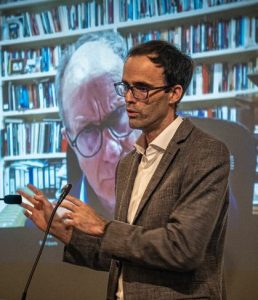On Tuesday 16 May 2023, the Australian Institute of International Affairs NSW welcomed Dr Harry Hobbs and Dr Ed Wensing, who both specialize in Indigenous affairs, to discuss the proposed Indigenous Voice to Parliament and what Australia can learn from other countries on this matter.
Dr Hobbs began by giving an outline of what shape the proposed Indigenous Voice to Parliament might take: an advisory body made up of Indigenous Australians empowered to make representations to parliament and government on matters relating to Aboriginal and Torres Strait Islanders. He argued that the Voice is necessary to rectify the absence of Indigenous participation in the drafting of the constitution and lack of acknowledgement of their unique rights and status in that document.
Dr Hobbs referred to examples of indigenous representation abroad in Scandinavia, Canada and New Zealand to provide context for the proposed model and to emphasise that it would be a much more limited measure by comparison. The proposed indigenous representative body in Australia would not oblige the government to consult it (as in Norway), mandate the government to have a fiduciary duty to Indigenous peoples (as in Canada) or require reserved seats in Parliament (as in New Zealand). It would not alter Australia’s existing system of government in any way.
Dr Wensing then joined the event by Zoom and concurred with Dr Hobbs’s speech – he was not able to visit the Institute in person because he had been called to an ad hoc conference in Canberra on Indigenous water rights at very short notice. He cited examples of other indigenous and minority representative bodies in South Africa, Germany, and Singapore. He noted that, while existing models help inform Australia in its efforts to improve Indigenous relations, Australia requires a solution specific to its own history and problems. A Voice would allow for a more efficient and organised way of dealing with Indigenous affairs than currently exists.
In the question-and-answer session, Dr Hobbs and Dr Wensing were asked if attention to indigenous affairs would dissipate after a Voice to Parliament is established. Dr Hobbs believed this to be unlikely. The Voice would take a further step and begin working with the government to set up a Makaratta Commission that would supervise promised treaty-making between States and Territories and Indigenous people. Dr Wensing drew our attention to the vigour with which Indigenous people have historically campaigned for their rights, forcing us to confront these injustices: such concerns were unlikely to subside.
Asked for practical examples of how the Voice would affect policy and legislation, Dr Hobbs thought that community issues such as cashless debit cards in Alice Springs, the need to raise the age of criminal responsibility and the need to implement advice from the Royal Commission would be heard more loudly on the national stage. Dr Wensing cited the example of local governance in the Central Darling shire of Western New South Wales. The Murdi-Paaki assembly, constituted under Aboriginal rather than Australian law, which contains community working parties and feed issues up to the assembly and on to the State and Commonwealth governments, could simply pass issues on to the Voice and to Parliament as well.
When asked how many Aboriginal communities there are with their own languages, Dr Hobbs said that he could not recall exactly but noted that different communities experienced colonisation to different extents and drew attention to the problem that there are hundreds of Indigenous communities and it would be a challenge for the Voice, a necessarily small body, to represent all their interests. Dr Wensing added that – because of settlement arrangements, missions, and reserves managed by states and churches – many remote communities existed, numbering over a thousand.
Asked whether, as an alternative to amending the constitution by referendum, there was any way to compel Parliament to listen to the Voice through legislation and whether legal battles would emerge if Parliament ignored it, Dr Hobbs explained that legislation of that kind could be passed but also simply reversed by Parliament later. Both Dr Hobbs and Dr Wensing noted that it was the consensus among legal experts that the government would have no obligation to listen to the Voice, with Dr Hobbs adding that a case could always be brought to the courts and fought out if there were sufficient basis.
Dr Wensing also referred to the ACT’s Human Rights Act, which makes explicit reference to the UN Declaration on the Rights of Indigenous People, as an example of the kind of legislation that parliament should adopt.
Report by Ryan Lung, AIIA NSW intern

Dr Hobbs addressing the meeting in person, with Dr Wensing participating by Zoom

Dr Hobbs (left) with AIIA intern Ryan Lung (right) and AIIA NSW president Ian Lincoln
